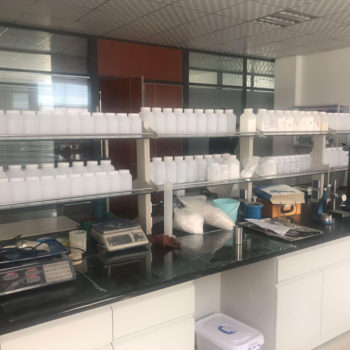Application method of hydroxyethyl cellulose in latex paint
1 Add directly when grinding the pigment
This method is the simplest and takes a short time. The detailed steps are as follows:
(1) Add appropriate purified water to the large bucket of the high-shear mixer (in general, ethylene glycol, humectants, and film-forming agents are added at this time)
(2) Start stirring continuously at low speed and slowly add hydroxyethyl cellulose
(3) Continue stirring until all particles are wet
(4) Add antifungal agent, pH adjuster, etc.
(5) Stir until all the hydroxyethyl cellulose is completely dissolved (the viscosity of the solution is significantly increased) before adding the other components in the formula and grinding until the paint is formed.
2 Equipped with mother liquor
This method is first equipped with a higher concentration of mother liquor, and then added latex paint.
The advantage of this method is that it has greater flexibility and can be directly added to the finished paint, but it must be properly stored.
The steps and methods are similar to steps (1)-(4) in method 1, except that a high-resistance agitator is not required. Use only a stirrer with sufficient power to keep the hydroxyethyl fibers uniformly dispersed in the solution. Continue stirring until completely dissolved into a viscous solution.
It should be noted that the antifungal must be added to the mother liquor as soon as possible.
3 formulated into porridge
Because organic solvents are poor solvents for hydroxyethyl cellulose. These organic solvents can therefore be used to prepare porridge. The most commonly used organic solvents are ethylene glycol, propylene glycol, and film-forming agents (such as hexanediol or diethylene glycol butyl acetate). Ice water is also a poor solvent, so ice water is often used with organic liquids to prepare porridge.
Porridge-like hydroxyethyl cellulose can be added directly to the paint. The hydroxyethylcellulose was fully swollen in the form of porridge.
When added to the paint, it dissolves immediately and acts as a thickener. After the addition, it must be continuously stirred until the hydroxyethyl cellulose is completely dissolved and uniform. Generally, porridge is made by mixing six parts of organic solvent or ice water with one part of hydroxyethyl cellulose.
After about 5-30 minutes, the hydroxyethyl cellulose was hydrolyzed and significantly swelled. In summer, the humidity of the water is generally too high, and it is not suitable to be equipped with porridge.
4 Matters needing attention when equipped with hydroxyethyl cellulose mother liquor
Since hydroxyethyl cellulose is a treated powder and granule, as long as the following matters are noted, it is easy to handle and dissolve it in water.
(1) Before and after adding hydroxyethyl cellulose, you must keep stirring until the solution is completely transparent and clear.
(2) It must be sifted into the mixing bucket slowly. Do not directly add the hydroxyethyl cellulose that has formed into agglomerates and balls into the mixing bucket.
(3) Water temperature and pH in water have a clear relationship with the dissolution of hydroxyethyl cellulose, so special attention must be paid.
(4) Do not add some alkaline substances to the mixture before the hydroxyethyl cellulose powder is wetted with water. Increasing the pH after soaking will help dissolve.
(5) Add the antifungal agent as early as possible.
(6) When using high-viscosity hydroxyethyl cellulose, the concentration of the mother liquor should not be higher than 2.5-3% (by weight), otherwise the mother liquor is difficult to handle.

